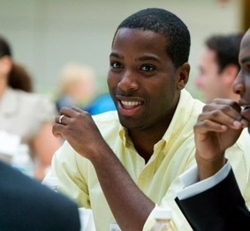 Tristan Walker is a rarity in Silicon Valley. He’s a gifted storyteller who intimately understands mobile and social media, having interned at Twitter before joining Foursquare, where he led business development for three years.
Tristan Walker is a rarity in Silicon Valley. He’s a gifted storyteller who intimately understands mobile and social media, having interned at Twitter before joining Foursquare, where he led business development for three years.
Those talents will come in handy, as Walker pulls the cover off his eight-month-old startup, Walker & Company, revealing its first product to be … a shaving kit.
Worth mentioning straightaway: This is an exceedingly nice shaving kit. In addition to a pure brass handle and German-made blades, each kit comes with rich pre-shave, shaving, and after-shave lotions, all tucked thoughtfully into an elegant box that’s designed to take 2.5 seconds to open. (It builds anticipation, Walker told me during a recent visit to the company’s offices, located a few miles from Stanford University.)
Priced as the kit is — a user pays $59 for his first, three-month supply, and $29 per month thereafter — it seems reasonably accessible, too, particularly considering the growing percentage of men willing to spend on grooming. According to the research company Mintel, the share of personal care products designed for men has grown to to 5.6 percent from 4.6 percent over the past five years.
Still, to break into a crowded market that already features both high-end competitors and affordable alternatives, Walker needs a compelling story, and he has one that he tells well. As he explains it, black, Latino, and Asian men and women have few personal care options beyond the “ethnic aisle of Walgreen’s,” where they’re left to examine which “dust-covered” product might be remotely suited for their hair texture or skin needs. To underscore his point, Walker, who is African-American, shows me an off-the-shelf hair-care product featuring a balding black man wearing a bath towel.
It’s that underserved market that inspired Walker & Co. The company’s shave kit, for example, has a single blade construction that’s particularly ideal for African-American men, who often struggle with extreme razor burn irritation because their facial hair tends to be curly.
Yet the kit is just the start, says Walker, who observes that people of color will represent the majority of American in the not-too-distant future, as well as that they tend to spend more than other demographic groups on personal care products. (Black women, who represent just 6 percent of U.S. population today, account for 30 percent of hair care spend, says Walker.)
Little wonder Walker is already imagining products such as high-end shampoos suited for the dry hair of African-American women, or skin-care products that address hyperpigmentation.
And none will be relegated to a drugstore aisle, says Walker, who is employing a direct-to-consumer e-tailing strategy, along with reaching people where they gather online. (Among other examples: the urban style blog Street Etiquette will soon begin publishing grooming content co-created with Walker & Co.)
Eventually, Walker & Co. — whose investors include Andreessen Horowitz, SV Angel, Upfront Ventures, and Sherpa Foundry — will also sell its products offline, says Walker. But telling the story comes first, and the shaving kit is not the story; it’s just the prologue.
“This is about fundamentally enabling access. It’s about making things more practical and delightful at the same time,” says Walker.
Traditional consumer packaged goods companies have had their chance, he suggests. Walker & Co. is “going to create the experience that [people of color] deserve.”
Sign up for our morning missive, StrictlyVC, featuring all the venture-related news you need to start you day.






